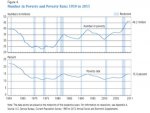Which is why America's rampant Income Disparity is unacceptable in a country that believes supposedly in "fair-play". How a nation can tolerate 15% of its population below the Poverty Threshold is beyond rationalization. Especially of the disrespectful kind, like, "Well that's the way the cookie crumbles".
As if the poor, born poor, had no rights other than that of a Poor Existence. As if humans never evolved beyond caveman status. Or, as if "luck" were the primary determinant of one's lifestyle. It's important, but the chances of winning the lottery is too small for us to consider it a serious guaranty of a viable existence.
No nation need do without them, and most "developed nations" have such guarantees.
But the nation that maintains for such a long period of time as the US, that 15% of the population should pass their existence below the Poverty Threshold is no amongst the most advanced. And in the US, that sort of existence is indeed "long-term".
One of these days I will try to get through Piketty.
Because I don't think the issue is quite what most people think that it is.
According to the World Factbook, the top 10% in the US got 30.0% of the income and the bottom 10% got 2.0%. And the GINI is c. .47. In France, the top 10% got 25.4%, the bottom 10% got 3.6% and the GINI is .301. Except for the GINI, those figures don't look that much different.
Don't trust poverty rates as those are based on whatever the country wants them based on. It doesn't make much sense that the US, with per capita GDP of $56,000 would have a 14.5% poverty rate while Laos with a $5,088 per capita GDP would have a 22% poverty rate. Things are normally globally priced. A refrigerator made in China probably cost roughly the same in Laos and the US, as would a flight to Paris. Those people in the US poverty rate are not starving. They get c. $22,000 in government aid of various kinds.
I think that the "problem" in the US, with the high GINI, is not due to those superrich but due to the fact that there is not a bell shaped curve of income in the US. On the low end, it goes up sharply. But on the high end, there is a gradual slope(until the sharp increase at the mega rich). Millions make $150,000 to 160,000/yr, or 3 times the average. Over a million make $190,000 to $200,000 a year. We have "normal" people, with normal education, ambition, and work ethic, who make 3-5 times the average. These are bureaucrats, public and private union employees, in addition to small business owners.
I wonder if you get that in Europe-this vast, skewed, spread of "middle" income people. GINI goes up when there are so many people making very good money. These are not mega rich Bill Gates types but people who went to school with you and got lucky with a high paying normal job. Taxing "the rich" or the 1%ers will not improve the GINI as much as heavily taxing these salaried employees making $60,000 to $250,000 a year. But these people don't consider themselves rich, even though they make 5 times other workers. They are not 1%ers. They are fighting tax increases. Obama made permanent the "Bush" tax cuts for these people yet they want more and claim that $200,000 in not a living wage and other nonsense.
Programs to lead to more income equality will have to go after these as well.

